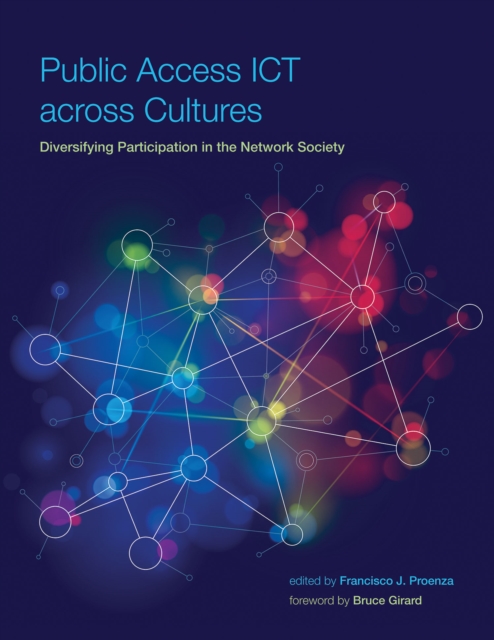
Public Access ICT across Cultures : Diversifying Participation in the Network Society PDF
Edited by Francisco J Proenza
Part of the International Development Research Centre series
Description
A systematic assessment of the impact of public access to computers and the Internet, with findings from developing countries in South America, Asia, and Africa.
Shared public access to computers and the Internet in developing countries is often hailed as an effective, low-cost way to share the benefits of digital technology. Yet research on the economic and social effects of public access to computers is lacking. This volume offers the first systematic assessment of the impact of shared public access in the developing world, with findings from ten countries in South America, Asia, and Africa. It provides evidence that the benefits of diversified participation in digital society go beyond providing access to technology. Public access venues-most often Internet cafes in cities and state-run telecenters in rural areas-are places for learning, sharing, working, empowerment and finding opportunities.
The book documents the impact of public access on individuals, on society and networks, and on women. Chapters report findings and examine policy implications of research on such topics as users' perceptions of the benefits of Internet cafe use in Jordan; ICT job training in Rwanda; understanding user motivations and risk factors for overuse and Internet addiction in China; the effect of technology use on social inclusion among low-income urban youth in Argentina; productive uses of technologies by grassroots organizations in Peru; use of technology by migrant ethnic minority Burmese women in Thailand to maintain ties with their culture and their family and friends; and women's limited access to the most ubiquitous type of venue, cybercafes, in practically all countries studied-and quite severely in some places, e.g. Uttar Pradesh, India.
Contributing Editors
Erwin A. Alampay, Roxana Barrantes Caceres, Hernan Galperin, Abiodun Jagun, George Sciadas, Ramata Molo Thioune, Kentaro Toyama
Chapter authors
Ali Farhan AbuSeileek, Carolina Aguerre, Oluwasefunmi 'Tale Arogundade, Nor Aziah Alias, Sebastian Benitez Larghi, Jorge Bossio, Juan Fernando Bossio, Marina Laura Calamari, Nikos Dacanay, Jean Damascene Mazimpaka, Laurent Aristide Eyinga Eyinga, Mary Luz Feranil, Ariel Fontecoba, Omar Fraihat, Martin S. Hagger, Jianbin Hao, Sulaiman Hashim, Izaham Shah Ismail, Haziah Jamaludin, Xuemei Jiang, Laura Leon, Guoxin Li, Balwant Singh Mehta, Nidhi Mehta, Marina Moguillansky, Marhaini Mohd Noor, Avis Momeni, Theodomir Mugiraneza, Jimena Orchuela, Patricia Pena Miranda, Alejandra Phillippi, Jimena Ponce de Leon, Ghaleb Rabab'ah, Saif Addeen AlRababah, Wei Shang, Ryan V. Silverio, Sylvie Siyam Siwe, Efenita M. Taqueban, Olga Balbine Tsafack Nguekeng, Xiaoguang Yang
Information
-
Download - Immediately Available
- Format:PDF
- Pages:496 pages
- Publisher:The MIT Press
- Publication Date:29/05/2015
- Category:
- ISBN:9780262328548
Information
-
Download - Immediately Available
- Format:PDF
- Pages:496 pages
- Publisher:The MIT Press
- Publication Date:29/05/2015
- Category:
- ISBN:9780262328548










